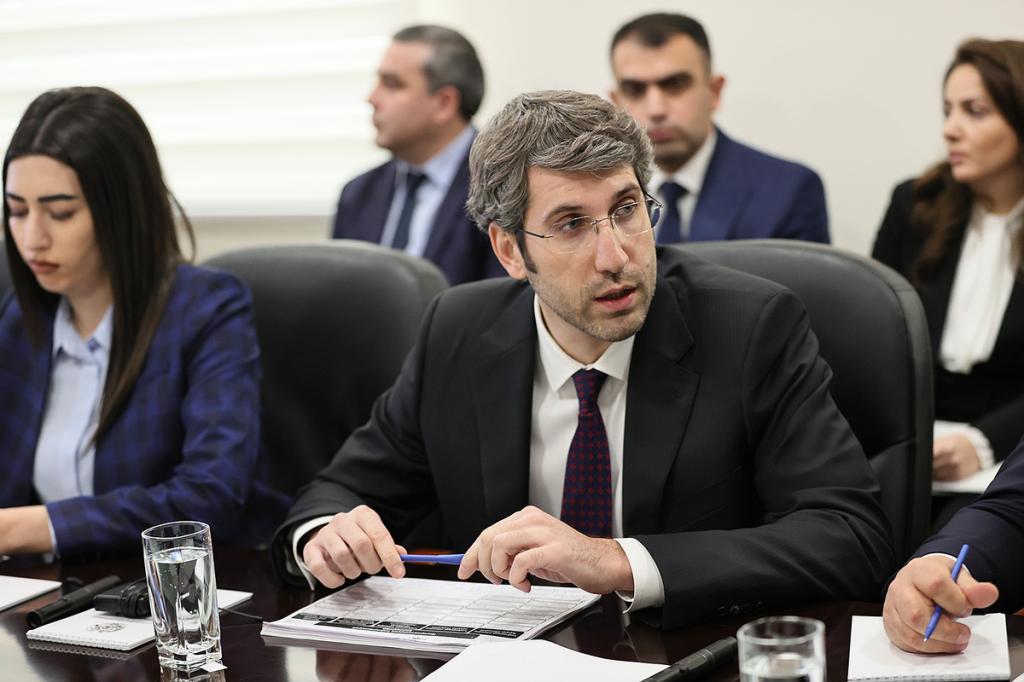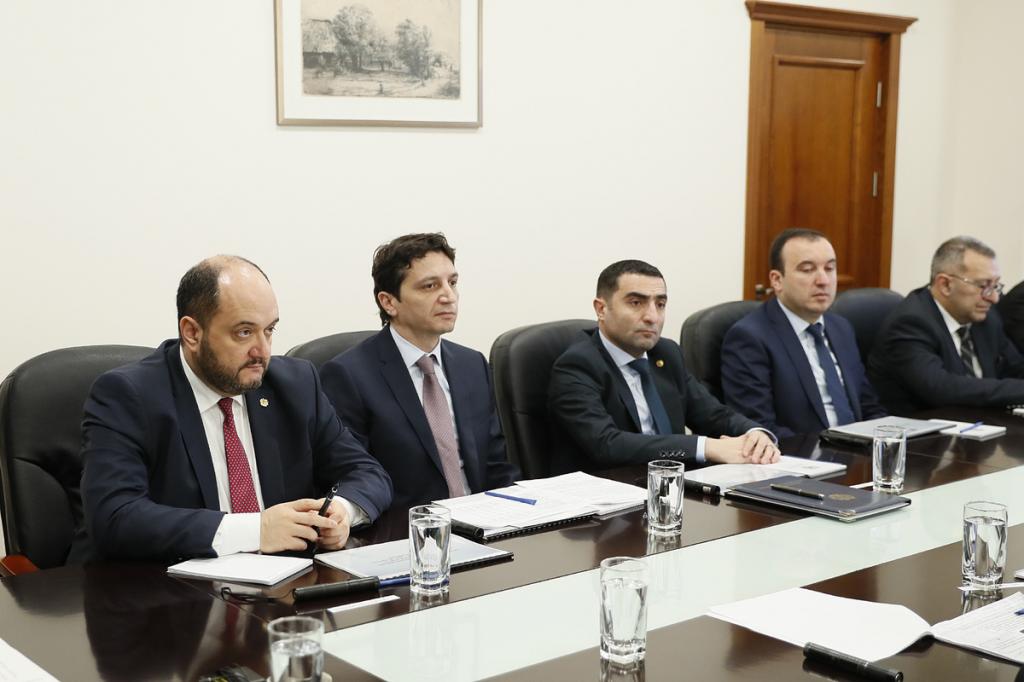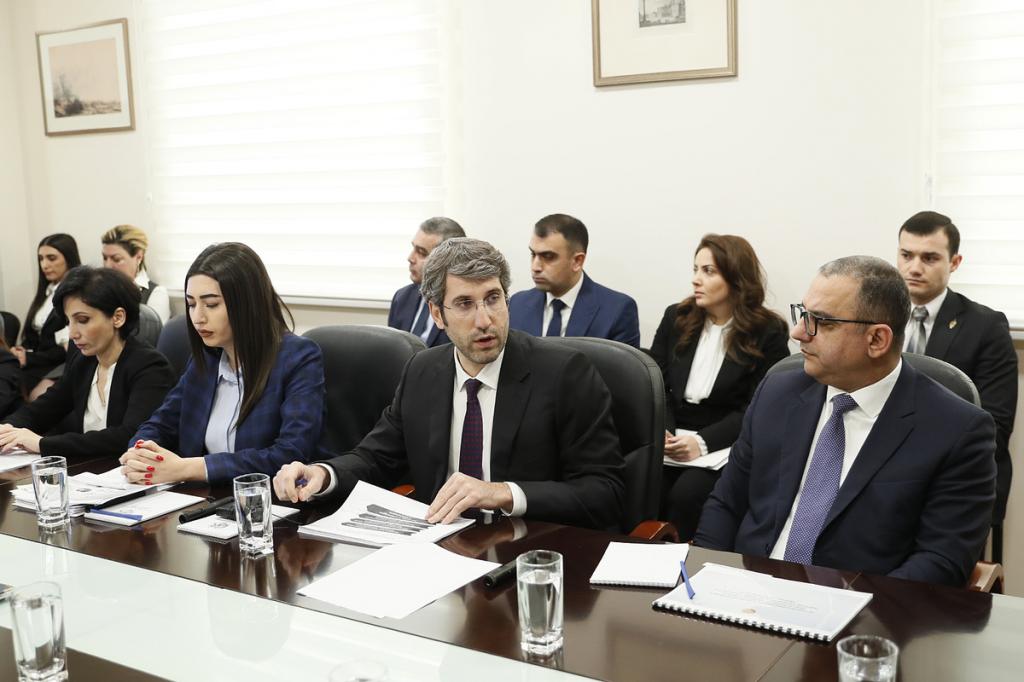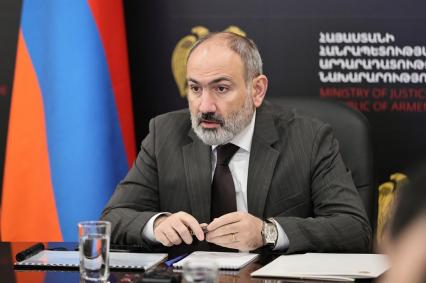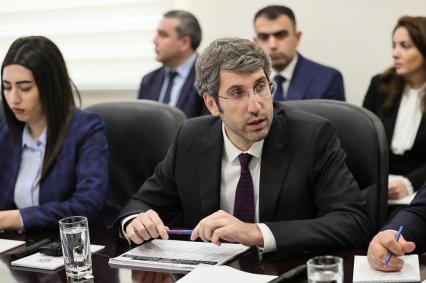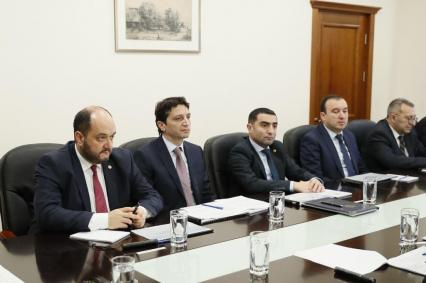Performance evaluation of activities of Ministry of Justice for 2022 submitted to Prime Minister
23/12/2022
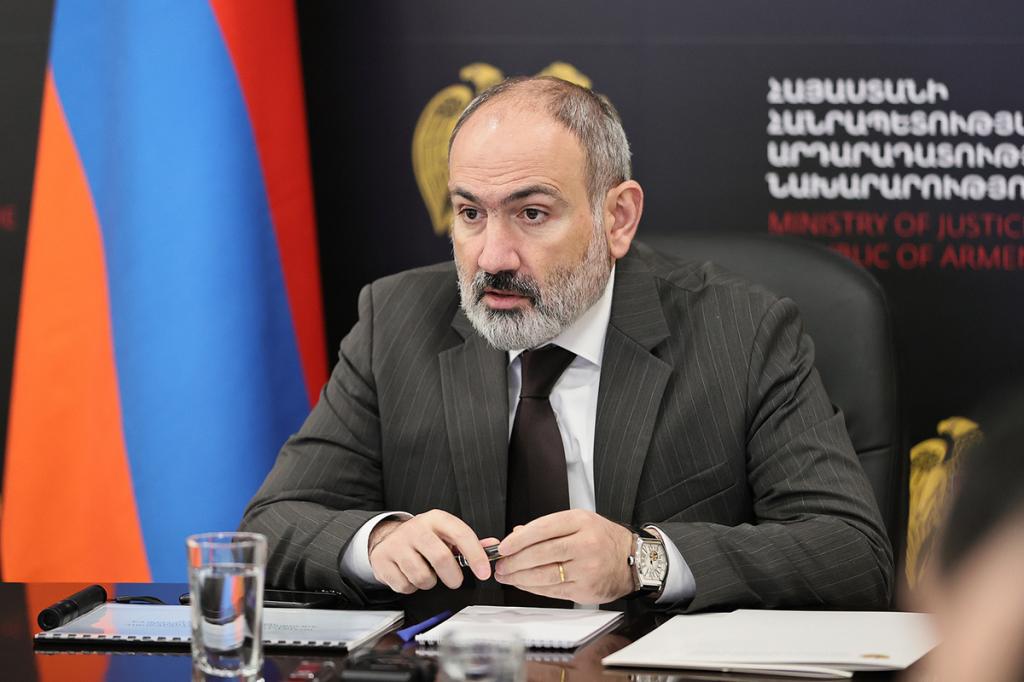
Prime Minister Nikol Pashinyan visited the Ministry of Justice to discuss the reports on the activities of the government agency for the year 2022.
Among the participants of the consultation were Deputy Prime Minister
Tigran Khachatryan, Chief of Staff of the Prime Minister Arayik Harutyunyan, Minister of Finance Vahe Hovhannisyan, Acting Minister of Justice Grigor Minasyan, Head of the State Supervision Service Romanos Petrosyan, officials of the Office of the Prime Minister, management staff of the Ministry of Justice and other officials.
Grigor Minasyan and the Deputy Ministers presented the activities carried out according to sectors.
First, the process of implementing reforms in the judicial and legal sectors was touched upon. It was reported that the salaries of judges have been increased in the reporting period — additional payment in the Constitutional Court has been fixed in the amount of 80% of the salary, and the supplement in the Court of Cassation has been fixed in the amount of 50% of the salary.
Separate Administrative and Anti-Corruption Chambers have been formed in the Court of Cassation. The National Assembly has adopted a law according to which criminal and civil courts of first instance are being set up in the city of Yerevan. The law on establishing the Anti-Corruption Court of Appeal has also been adopted, which will ensure a specialised three-level examination of anti-corruption cases.
The positive opinion of the Venice Commission has been received with respect to envisaging the possibility of appeal against decisions of the SJC rendered under disciplinary cases.
It was mentioned that throughout 2022, 41 disciplinary proceedings against the judges were initiated, 15 were dismissed, 18 motions were filed with the Supreme Judicial Council. Currently, 8 initiated disciplinary proceedings are under examination, 3 disciplinary proceedings were initiated based on the decisions of the European Court of Human Rights.
Information was provided on the activities being carried out for improvement of the conditions of buildings of courts.
It was mentioned that civil procedure is being digitised in the e-justice sector, and the acceptance of new programmes will be organised with help from Grant Thornton Company. The e-system of pre-trial proceedings has been launched in Vayots Dzor, the “Personal Office” platform for the Compulsory Enforcement Service has been introduced, and the e-penitentiary system for the Penitentiary Service is being upgraded.
It is envisaged that in 2023, the “E-Justice” platform will be launched; administrative, criminal and anti-corruption proceedings will be digitised, and the system of distribution of cases will be improved. Also the website for monitoring the Strategy for Judicial and Legal Reforms will be running. In 2023, the new system of the Compulsory Enforcement Service will be introduced, the electronic platforms for mediation and bankruptcy will be developed, e-register and e-draft will be upgraded, and the platform for anti-corruption monitoring will be developed.
As a result of the reforms implemented in the sector of the Compulsory Enforcement Service, out of 17 banks, the processes of levy and unblocking of funds has been optimised in 11 banks (1 day instead of 7 days), the draft concept paper for introduction of a new model of the Compulsory Enforcement Service is being revised. A new procedure has been introduced, according to which there cannot be technical inspection of vehicles wanted upon the decision of a compulsory enforcement officer. It was also reported that the amount of levy has increased by AMD 5 billion during the current year, which is 40% more than the previous amount, compared with the previous year.
Within the scope of activities of the “Expertise Center” of the Ministry of Justice, the new Division for Psychological Expert Examinations has been established. All the expert examinations assigned before 2015 have been completed. The salaries of experts have been raised by 92.7% during the current year, as a result of which the amount of salaries ranges from AMD 700 thousand to AMD 800 thousand.
Around 100 draft laws have been developed in the criminal justice sector. Upon legislative initiative, investigative bodies have been combined, meaning 2 investigative bodies – the Anti-Corruption Committee and the Investigative Committee – will be operating starting from 1 January 2024. The new Penitentiary Code entered into force during the current year, replacing the Code adopted almost 20 years ago.
In the sector of the Penitentiary Service, for the purpose of building a new penitentiary institution, a sketch version has been developed, and an engineering geological survey has been conducted. “Abovyan” Penitentiary Institution, “Armavir” Penitentiary Institution and “Sevan” Penitentiary Institution have undergone capital renovation. For the first time, a video surveillance system was introduced at “Armavir” Penitentiary Institution. The package with regard to voluntary attestation is already ready for penitentiary officers. The model of officer training will be introduced at “Armavir” Penitentiary Institution as a pilot model; for the first time, a convict over 19 has been provided with the opportunity for general education, and the right of foreigners to communicate has been ensured. An electronic monitoring system for the execution of home detention as a measure of restraint has been acquired, the
e-probation system has been launched, 5 offices of the Probation Service in the city of Yerevan and 3 offices of the Probation Service in marzes have undergone capital renovation. It was also informed that the "Prison Medical Center" SNCO will be transferred to the subordination of the Ministry of Health.
Within the scope of the reforms of the Ministry of Internal Affairs, the legislative package has been adopted, and it has been signed by the President. It was stated that the Patrol Service has been launched in Lori and Shirak Marzes, the educational process of the Patrol Service in the next 4 marzes has been initiated, and admission has been announced for the next 4 marzes.
In 2023, it is envisaged to ensure substantial formation of the Ministry of Internal Affairs and implementation of the planned changes within the subordinate state bodies. The legislative package and roadmap for formation of the Police Guard will also be submitted, and the Patrol Service will be introduced within the entire territory of the Republic of Armenia. The Water Patrol Service will also be launched. Individual admission will be announced for the purpose of promoting the engagement of female patrols in the Patrol Service.
Within the scope of anti-corruption reforms, the regulations regarding the acceptance of gifts by officials, incompatibility requirements, conflict of interests have been clarified, and the whistle-blowing system has been improved. The Communication Action Plan for Fight against Corruption has been implemented. In 2023, it is envisaged to adopt the new Anti-Corruption Strategy and to implement legislative reforms targeted at integrity checks.
The responsible officials informed that the package adopted following discussions with the majority of all judges in Armenia, envisages introducing a new qualification procedure for judges, a new mechanism for inclusion in the list, by which persons with 8 years of professional experience will be able to be included in the list of contenders. The package also envisages the possibility of assigning the examination of pre-trial proceedings from certain judges to the courts of general jurisdiction, and to assign the function of returning the statement of claim in technical cases to assistants to judges, reducing the workload of judges. At the same time, during the last two years of the age for holding office, a judge will be allowed to examine only the cases on issuing orders for payment and cases of simplified proceedings, and arbitration centres will be allowed to issue writs of execution.
In 2022, as a result of joint working discussions with sector-specific non-governmental organisations, upon mutual consent, the draft of the concept paper on institutionalisation of the mass media self-regulation system was developed in the sector of mass media reforms; the concept paper is being agreed upon with the interested parties.
In order to support the creation of the new Arbitration Centre, a steering advisory committee consisting of 27 reputable national and international experts was formed during the reporting period. These experts will go on to become members of the arbitration board of the Centre and arbitrators. The charter of the Arbitration Centre has already been approved by the Advisory Committee, the arbitration rules and other documents are currently being developed.
As a result of the activities carried out during the current year, the possibility of on-line mediation is envisaged, compulsory mediation has been introduced in some family cases, and an electronic procedure for selecting and appointing mediators has been established.
Within the scope of constitutional reforms, the Council for Constitutional Reforms has been formed, 30 public discussions have been held in different formats in Yerevan and in marzes, around 10 sessions of the Council and the Committee have been held. The Professional Commission on Constitutional Reforms has been formed, the conceptual sections with respect to issues related to the form of government, the role and status of the President, and the acts of supranational organisations have been prepared, and the majority of parties have given a positive opinion on the form of parliamentary governance.
The concept paper on the modern model of the Civic Centres has also been approved, by which it is envisaged to create civic centres on the basis of Haypost post office.
Within the scope of the reforms in the public administration sector, 126 existing strategic documents have been reviewed, an assessment of appropriateness has been conducted, and a new model for strategic planning has been defined; the number of documents has been reduced, and the hierarchy has been specified. It is envisaged to review and upgrade about 460 state and community services, their digitisation, as well as the development of a unified model for providing services. Review of the remuneration of public servants, development of a new system, implementation of actions to make civil service more attractive and competitive, structural and functional optimisation of the executive power, increase of efficiency of decision-making, and development of new procedures for issuing and executing assignments, are also envisaged.
Prime Minister Pashinyan emphasised the need for effective implementation of reforms in all of the above-mentioned directions and particularly attached special importance to the reforms being implemented in the judicial and legal sector. "Establishing a truly independent judicial system will also have a great economic effect," the Prime Minister said. Nikol Pashinyan assigned to pay special attention to improvement of the building conditions of courts. The Prime Minister added that the judicial system should have the potential required in terms of infrastructure, substance and personnel and that the activities in this direction should be carried out in close co-operation with the Supreme Judicial Council. The Prime Minister attached importance to the implementation of the plan for construction of a justice district, the works for renovation and modernisation in penitentiary institutions and added that they should be in line with the process of fighting against the criminal subculture, as well as have proper and dignified conditions.
Touching upon the activities carried out in the e-justice sector, the Prime Minister stated that they should be advanced within the scope of the reforms for general digitisation.
Nikol Pashinyan also spoke about the process of releasing convicts from serving further punishment, emphasising that it should be carried out on the basis of an expert opinion.
Touching upon the Patrol Service, the Prime Minister assigned to carry out consistent activities for expansion of the involvement of women and for continuous development of the service, including through attestation.

